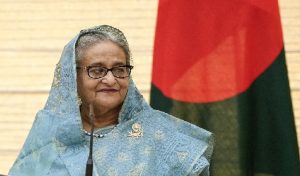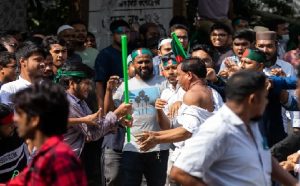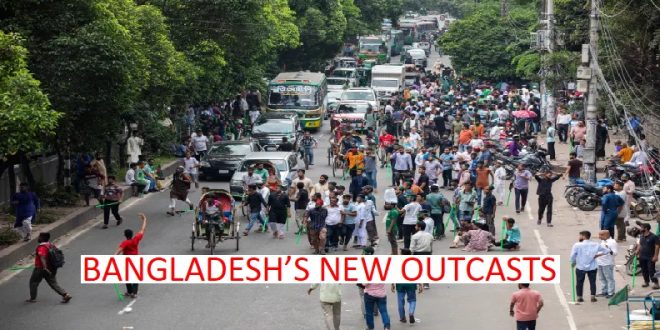28-10-2024
DHAKA: Since early August, Fahmi*, 24, who used to be a dominant figure on the sprawling campus of Dhaka University in Bangladesh’s capital, has been in hiding.
Fahmi was a member of the Bangladesh Chhatra League (BCL), the student wing of former Prime Minister Sheikh Hasina’s Awami League (AL) party that ruled over the South Asian nation with an iron fist for more than 15 years before she was ousted and forced to flee to neighboring India following a student-led movement in August.
 On Wednesday, Bangladesh’s interim government, led by its only Nobel laureate, Muhammad Yunus, declared the BCL a “terrorist organization” and banned it. The Ministry of Home Affairs said the BCL had a history of serious misconduct over the past 15 years, including violence, harassment and exploitation of public resources.
On Wednesday, Bangladesh’s interim government, led by its only Nobel laureate, Muhammad Yunus, declared the BCL a “terrorist organization” and banned it. The Ministry of Home Affairs said the BCL had a history of serious misconduct over the past 15 years, including violence, harassment and exploitation of public resources.
“Not long ago, I was a voice of authority here,” Fahmi, an undergraduate student of applied chemistry, told media. “Now, I am running around like a fugitive with no probable future.”
Fahmi’s story mirrors that of thousands of students formerly affiliated with the AL, whose once-powerful hold over Bangladesh’s campuses collapsed overnight. The former powerbrokers on campuses and the AL’s muscle on the streets now face eviction, retribution and even imprisonment for their role in trying to suppress the popular revolt against Hasina and for the rights violations they allegedly committed while she was in power.
Fahmi maintains he did not directly participate in the government’s deadly crackdown against people during the anti-Hasina demonstrations. “My sisters were part of the protests,” he said. “I also believed in the cause but was trapped by party obligations.” The deadly protests began in July after college students demanded the abolition of a controversial reservation system in government jobs that they said favored supporters of the governing party. Though Bangladesh’s top court scrapped the quota, the protests soon morphed into a wider call for the removal of Hasina’s “autocratic” regime, marked by allegations of widespread rights violations.
The government’s response was one of the bloodiest chapters in Bangladesh’s history as security forces beat the protesters, and fired tear gas and live ammunition on peaceful demonstrators, killing more than 1,000 people in three weeks and arresting thousands of others.
 On August 5, as defiant Bangladeshis stormed prominent government buildings, including Hasina’s residence and the parliament, the 77-year-old prime minister fled the country in a military helicopter and sought refuge in New Delhi.
On August 5, as defiant Bangladeshis stormed prominent government buildings, including Hasina’s residence and the parliament, the 77-year-old prime minister fled the country in a military helicopter and sought refuge in New Delhi.
The violence, however, did not end with Hasina’s fall. The former perpetrators of state atrocities became the new targets as hundreds of AL politicians and members, including students, were attacked or killed. Many went into hiding or were detained while attempting to flee.
Fahmi said the anti-Hasina protesters set fire to his family’s home and cold storage business in Noakhali district, 173km (107 miles) from Dhaka. “They threatened to make my younger brother disappear if he didn’t disclose my whereabouts,” he said. So far, they haven’t acted on the threat, said Fahmi, though his younger brother has been bullied at the madrasa [a Muslim educational institution] where he studies.
Reflecting on his BCL involvement, Fahmi admitted, “I was a good student who cared little for politics, but at Dhaka University, hall politics was unavoidable. You either joined, or you suffered.” He admitted that being a BCL leader would improve his prospects of landing a government job, an appealing incentive in a shrinking job market especially since his responsibilities towards his mother, two unmarried sisters, and younger brother grew after his father’s death two years ago. (Int’l Monitoring Desk)
 Pressmediaofindia
Pressmediaofindia




